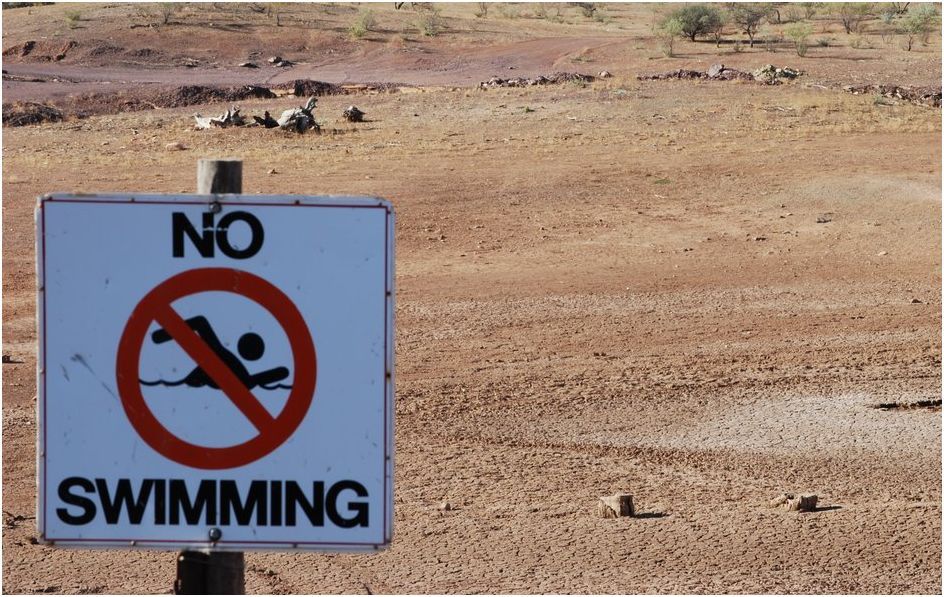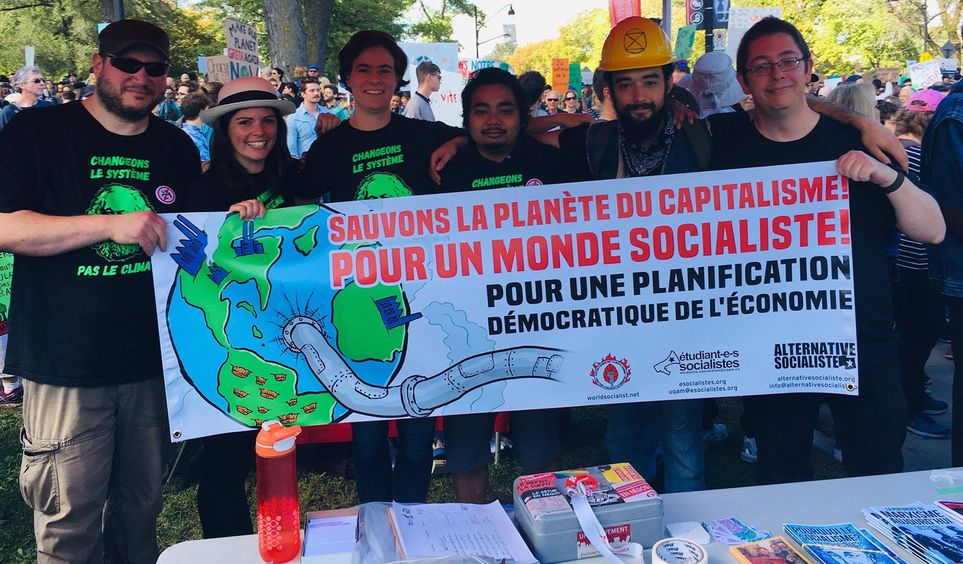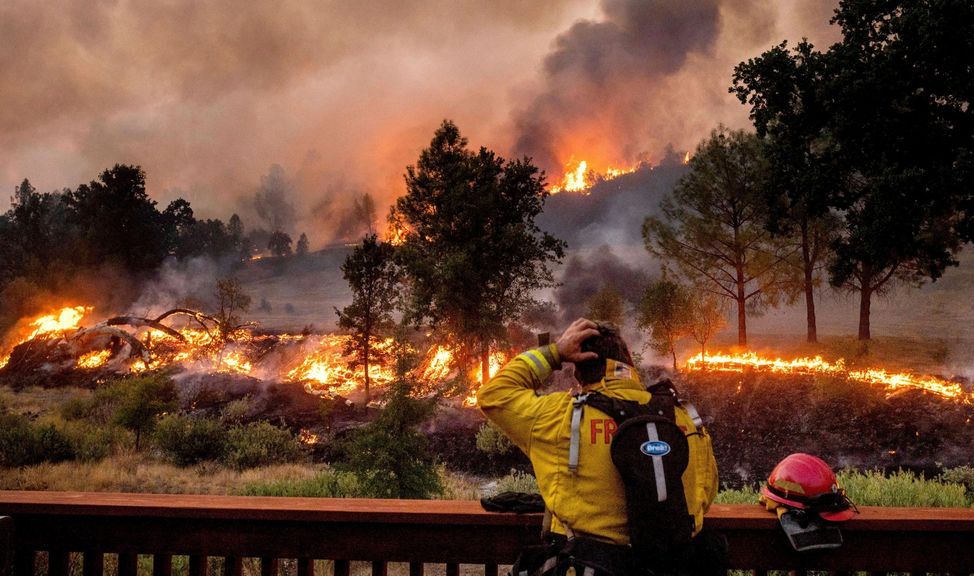Connor Rosoman is a member of Socialist Alternative (England, Wales & Scotland).

“12 years to save the planet”. Last year, the world received a wake-up call. Leading climate scientists working for the UN’s Intergovernmental Panel on Climate Change (IPCC) predicted that we have only 12 years before global temperatures will have risen by 1.5°C. Going beyond this point would mean a drastic rise in extreme weather conditions such as droughts, floods and heatwaves, which would have disastrous effects in society and on the world’s ecosystem as a whole.
Already, at average temperatures of 1 °C above pre- industrial levels, the effects of climate change are being felt in many parts of the world. In recent years, wildfires have ravaged sections of Europe and North America. And in June, a deadly heatwave saw temperatures soaring past 50°C in parts of India. The report points out that poorer parts of the world are disproportionately affected by climate change. Lack of access to healthcare and resources means that not only are these countries amongst the worst hit by climate change, they are also most vulnerable to its effects. A year on from the IPCC report, there are more like eleven years left – we need to act fast!
In the face of this looming environmental crisis, a new movement to fight climate change has taken off. There is an almost universal sense of urgency from workers and especially among young people who know we have to drastically change things in order to halt climate change. The report itself raises the need for “urgent and unprecedented change” in how society is run if we want to meet the IPCC’s maximum limit of a 1.5°C rise in global temperature. This is the same limit set by the Paris Agreement in 2016, where 195 countries agreed to take measures against the climate crisis.
But for decades, politicians have ignored the threat of climate change or put off the issue. Even recently, infamous climate change denier Donald Trump has pulled the US – the world’s biggest economy – out of the Paris Agreement. In Brazil, the right-wing president Bolsonaro represents an existential threat to the Amazon rainforest. Forests absorb 2.4 billion metric tonnes of CO2 every year, but Bolsonaro has indicated that he will open it up to agri-business and mass deforestation. These are steps backward, and represent a serious threat to reducing greenhouse gas emissions to the extent we need to over the coming years.
In response to this desperate situation, Greta Thunberg’s call to action has been a welcome change. Her example, of striking from school to protest against Swedish government inaction on the crisis has found an echo and become an inspiration for thousands of young people who, since 2018 have collectively organised protests throughout the world.
The movement of school and college students has shown an inspiring militancy, determination and seriousness. An estimated 1.5 million came out for the global student strike on 15 March. Over the following months, students have continued to walk out in their thousands, demonstrating a continued dedication to the cause of climate justice. It is also important that they have adopted the method of strike action in the movement. Other movements, such as the women’s movement, have also adopted this tactic, traditionally used by workers fighting for their rights. This shows the beginnings of an increased consciousness around the power of collective struggle as a tool for change. The example set by the school strikers could feed into other layers of the working class and inspire new struggles in the future.
Greta Thunberg’s recent call for a general strike against climate change is another important step forward. The ‘Earth Strike’, set for the week September 20 – 27, has support in Britain from unions such as the UCU, representing workers in Higher Education, and BFAWU, among others. The working class and their organisations, the trade unions, are the most powerful force for change in society. Were a successful general strike to be staged, and all workers stopped working to go on strike alongside school students, society would grind to a halt. Supported by the power of the organised working class, the September Earth Strike could be an important turning point in the movement, even without a full-scale general strike.
Solutions within the system?
So far there have been mixed ideas on the school strikes about how to tackle climate change. This has a number of reasons, reflecting different levels of consciousness in wider society. Capitalism tries to convince us that individual changes in our lifestyle can overcome capitalism’s climate catastrophe, rather than political change. But only 100 companies contribute to 71% of CO2 emissions. Our individual choices can only have a very small impact if the problems with the system as a whole are not addressed. There is a need for leadership in the movement that can cut through this confusion by offering a clear idea of a way forward.
Many youth strike organisers currently claim that they are ‘political but not party political’. Extinction Rebellion has called for a citizens’ assembly on climate change – a randomly selected group that acts as a consultative body for the government. In practice, ideas like this mean renouncing the idea of political change, as they offer no challenge to the current government or system.
With Boris Johnson as Prime Minister, it poses an important question to the movement: can the Tory government be trusted to carry out the changes we need? Johnson’s government consists of MPs with a history of supporting fracking, cutting funding for renewable energy and taking donations from climate change denial organisations.
The Conservative Party is funded by the very companies responsible for the bulk of climate change, and represents their interests. Any ‘solutions’ they would propose will inevitably place the burden on the shoulders of ordinary people, rather than their rich backers. Recent measures such as increasing charges on plastic carrier bags are an example of this. The case of the Gilets Jaunes (yellow vests) in France, who took part in protests against French President Emmanuel Macron’s fuel tax at the end of last year, shows what the response might look like if the Tory government tried similar large scale measures here. Big business is responsible for climate change – they should pay for it, not us.
The Boris Johnson government highlights the need for a political challenge if we want to fight climate change. Many climate strikers are already coming to these conclusions, having seen the government’s inaction since the movement began. These strikes are radicalising a new generation of future activists and trade unionists who are developing their own traditions of struggle as consciousness catches up with the period of crisis we are in.
Socialist change
Greta Thunberg made the news around the world when she told the UN “If solutions within this system are so hard to find, then maybe we need a new system.” Now, many students on the strikes are beginning to look towards ideas like the Green New Deal, as popularised by Alexandria Ocasio-Cortez in the USA. The slogan of “system change not climate change” has been taken up by many within the school strikes. However, there is not a clear, unified idea of what “system change” might look like in practice.
Organisations of climate activists like Extinction Rebellion, along with trade unions who have supported the strike, should reach out to students to build a wider Earth Strike Assembly that would be able to democratically discuss how we take the movement forward. Some assemblies of this sort have already been called, particularly in London. These will be fully supported by Socialist Alternative and CWI members. What it will need from now is genuine involvement from the workers’ movement and climate activists to build it into a vehicle for a new mass climate campaign.
An assembly like this could build for further Earth Strikes by calling on unions to get involved to plan further action following the initial strike. Trade unionists can support the call for a general strike by passing resolutions in their branches and demanding their leadership take action.
The task for socialists in the climate movement is to explain what ‘system change’ means in practice, in order to arm the movement with the ideas that can challenge capitalism and give an organised voice to that slogan. This could include demands such as:
- For massive investment in green energy so that we can transition away from fossil fuels.
- For free and integrated public transport to provide an alternative to using cars.
To realise these demands, socialists fight for democratic control over the agri-business, fossil fuels and large-scale manufacturing sectors, so that they can be planned on an environmentally sustainable basis rather than for profit. Even now, corporations like Shell and BP move to block binding measures on climate policy, even as they promote themselves as caring for the planet. In most cases, this can start by taking the massive corporations dominating these industries into public ownership – you can’t control what you don’t own. However, many of the top 100 CO2-producing companies are already state-owned fossil fuel companies.
Public ownership must also be linked with the idea of democratic workers’ control and planning in society as a whole, so that we can begin to run these companies on an accountable basis, and transition them away from fossil fuels.
These demands run contrary to the aims of capitalism, where profit and the private ownership of the world’s resources comes first. That is why the system change we need is socialist change. If we want to end the climate crisis, we have to also end the capitalist system that is driving it. A democratically planned, socialist economy could be run based on the needs of people and the planet. As thousands of school students have said: “there is no planet B”.
What we fight for
- Massive public investment in renewable energy, high quality and efficient, free, public transport, eco-friendly construction and housing for all, recycling and repairing facilities
- Take the big energy industries as well as major banks and industries from the hands of the capitalists into democratic public ownership
- Use these resources to develop ecological technologies and materials while guaranteeing that no jobs are lost but converted into socially useful ones with no loss of pay
- Continue the youth climate strike; broaden it by reaching out to working-class people and trade union
- Fight to replace capitalism with a society based on needs, not profits – a democratic socialist society which plans how to sustainably use the resources of the planet to meet the needs of the majority



